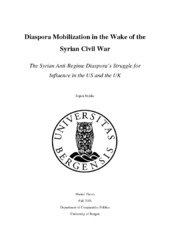Diaspora Mobilization in the Wake of the Syrian Civil War. The Syrian Anti-Regime Diaspora’s Struggle for Influence in the US and the UK
Master thesis
Permanent lenke
https://hdl.handle.net/1956/15478Utgivelsesdato
2016-11-21Metadata
Vis full innførselSamlinger
Sammendrag
This thesis seeks to analyze the Syrian diaspora's political mobilization emerging in the United States and the United Kingdom after the inception of the 2011 uprising. Despite extensive mobilization, the diaspora has been unable to exert influence on host state policies. Providing an original look at diaspora politics, this thesis employs social movement impact theory in an effort to answer an often- neglected question in diaspora and social movement research: why movements fail. The thesis attempts to cover this research gap by answering the following research question: Why has the Syrian diaspora failed to influence host state policies in the United States and the United Kingdom? The thesis makes three separate sets of theoretical propositions based on the works of other social movement scholars. One emphasizes internal factors, such as mobilization structures, while the remaining two emphasize external factors, such as national political context and discursive opportunities respectively. To evaluate these propositions, the thesis engages in the strategy of paired comparison and utilizes primary data gathered through fieldwork conducted in both case countries and secondary source material. The findings suggest that there is no magic bullet" when it comes to explaining failure to impact host state policies. Both internal and external factors offer convincing narratives of the diaspora's lack of impact. In terms of internal factors, both cases reflect two different trajectories. In the US, the Syrian diaspora's uncoordinated and fractionalized mobilization limited its influence. In the UK, the diaspora was better coordinated, but lacked a strong lobby needed to achieve influence. Furthermore, the analysis indicates that external factors, such as shifting policy alignment, divided elites, insufficiently influential allies, unfavorable public opinion, and lack of discursive opportunities, had constraining effects on the diaspora's ability to influence policies. The thesis demonstrates the need to consider both internal and external factors when studying movement outcomes. It shows the utility of studying how movements fail and how social movement theory can be incorporated into diaspora politics.
